
Computer Supported Cooperative Work-The Journal of Collaborative Computing and Work Practices
Scope & Guideline
Empowering collaboration in technology-mediated environments.
Introduction
Aims and Scopes
- Socio-Technical Systems:
The journal emphasizes the design and analysis of socio-technical systems, exploring how technology interacts with social practices, and how these interactions shape collaborative work. - Collaborative Work Practices:
A core focus is on understanding and improving collaborative work practices in various contexts, including healthcare, education, and community engagement. - Human-Computer Interaction (HCI):
The journal incorporates research on HCI, particularly how users interact with collaborative technologies and the implications for design and usability. - Ethics and Social Responsibility:
The journal addresses ethical considerations in collaborative work, including issues of privacy, trust, and the impact of technology on social practices. - Participatory Design:
Participatory design methodologies are highlighted, emphasizing the involvement of users in the design process to create more effective collaborative tools and environments. - Emerging Technologies:
The journal explores the impact of emerging technologies such as AI, machine learning, and data-driven systems on collaborative work, providing insights into their potential and challenges.
Trending and Emerging
- AI and Automation in Collaborative Work:
The integration of AI and automation into collaborative practices is a growing focus, exploring how these technologies can enhance efficiency while addressing ethical concerns around trust and transparency. - Community Engagement and Social Activism:
There is an increasing emphasis on community engagement and social activism, particularly how technology facilitates collaborative efforts in grassroots movements and local initiatives. - Health Informatics and Collaborative Care:
Research on collaborative practices in healthcare, especially in the context of data-driven decision-making and patient-generated health data, is gaining traction, highlighting the importance of collaborative care models. - Remote and Hybrid Work Dynamics:
As remote work becomes more prevalent, studies examining the dynamics of collaboration in remote and hybrid environments are trending, focusing on tools and practices that support effective teamwork across distances. - Ethics in Technology Use:
An emerging theme is the exploration of ethical implications of technology in collaborative settings, including trust-building, privacy concerns, and the social responsibilities of technologists.
Declining or Waning
- Traditional Workplace Collaboration:
There is a noticeable decrease in studies focused solely on traditional workplace collaboration models, as more attention shifts to remote and hybrid work environments. - Single-Disciplinary Approaches:
Research that solely adheres to a single discipline without interdisciplinary collaboration is becoming less common, as the complexity of collaborative work requires diverse perspectives. - Static Technology Assessments:
Papers that provide static assessments of technology without considering their dynamic interactions with social practices are declining, as the focus shifts to more fluid and adaptable frameworks. - Generalized User Experience Studies:
There is a waning interest in generalized studies of user experiences without contextual grounding, as researchers now emphasize context-specific insights and participatory approaches.
Similar Journals
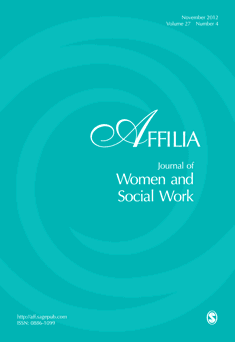
Affilia-Feminist Inquiry in Social Work
Advancing Feminist Perspectives for Social Justice.Affilia - Feminist Inquiry in Social Work, published by SAGE Publications Inc, stands as a critical scholarly platform dedicated to advancing feminist perspectives and social justice within the realm of social work. Since its inception in 1986, this prestigious journal has contributed significantly to the fields of Gender Studies, Social Sciences, and Social Work, consistently earning a Q1 ranking in these categories as of 2023. With a commendable Scopus ranking placing it among the top tiers of its field—ranked 28th in Gender Studies and 81st in the broader Social Sciences—the journal aims to foster an engaging discourse around the intersection of gender, social inequalities, and community practices. Although it does not operate under an Open Access model, its insights are invaluable to researchers, professionals, and students eager to explore and contribute to feminist scholarship and evidence-based practices in social work. As we approach its convergence period concluding in 2024, Affilia continues to challenge existing paradigms and empower voices within social work, making it an essential resource for those committed to progressive change.
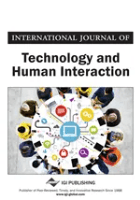
International Journal of Technology and Human Interaction
Fostering Interdisciplinary Dialogue on Technology's ImpactInternational Journal of Technology and Human Interaction, published by IGI Global, serves as a critical platform for the exploration of the intersection between technology and human behavior, offering an interdisciplinary lens on topics within the realms of Human-Computer Interaction and Information Systems. With an ISSN of 1548-3908 and an E-ISSN of 1548-3916, this journal has been contributing to scholarly discourse since its inception in 2005, with ongoing publication until 2024. Hosting a diverse range of research articles, case studies, and reviews, the journal aims to advance the understanding of how technology influences human experience and interaction patterns in various contexts. Although currently positioned in the Q4 quartile of both Human-Computer Interaction and Information Systems categories, the journal fosters knowledge that aspires to redefine scope and standards within the field. Its commitment to quality research is reflected in its Scopus rankings, showcasing its relevance despite its emerging status in academia. Targeting researchers, professionals, and students alike, the International Journal of Technology and Human Interaction invites contributions that address the pressing challenges and innovations at the nexus of technology and human interaction.
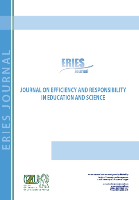
Journal on Efficiency and Responsibility in Education and Science
Connecting Research to Real-World Educational ImpactJournal on Efficiency and Responsibility in Education and Science, published by CESKA ZEMEDELSKA UNIV & PRAZE, stands as an essential resource in the field of education research. With an ISSN of 2336-2375 and an E-ISSN of 1803-1617, this Open Access journal has been dedicated to disseminating high-quality scholarly work since its inception in 2010, ensuring wide-ranging accessibility for academics and practitioners alike. Based in the Czech Republic, the journal invites contributions that explore innovative practices and sustainable approaches in education and science, with an impactful Scopus ranking position in the 46th percentile among Social Sciences education journals. The journal is recognized in the 2023 category quartiles as Q3 in Education, reflecting its commitment to facilitating rigorous research and discussion. The coverage spans from 2008 to 2024, making it a vital reference for those engaged in advancing educational efficiency and responsibility.
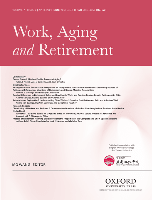
Work Aging and Retirement
Empowering knowledge on the intersection of work and aging.Work Aging and Retirement is a leading academic journal published by Oxford University Press, focusing on the critical intersections of work, aging, and retirement. With its ISSN 2054-4642 and E-ISSN 2054-4650, this journal serves as an essential platform for researchers and practitioners in fields such as economics, gerontology, industrial relations, and organizational behavior. Its outstanding performance is reflected in its Q1 quartile rankings across multiple categories, including Economics, Geriatrics, and Sociology, showcasing its influence in advancing knowledge and policy in the dynamics of aging workforces. The journal thrives on the enriching exchange of ideas and concepts that address both theoretical frameworks and practical implications concerning aging workers and their retirement processes. Although it does not offer open access, subscribers can access cutting-edge research that informs best practices and promotes effective strategies for managing age diversity in the workplace. With its focus on the implications of an aging population on various facets of society, Work Aging and Retirement is crucial for anybody seeking to contribute to this important and timely field.
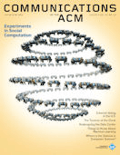
COMMUNICATIONS OF THE ACM
Illuminating Pathways in Computer ScienceCOMMUNICATIONS OF THE ACM, an esteemed journal published by the Association for Computing Machinery, has been at the forefront of the field of computer science since its inception in 1958. With an impressive impact factor and recognized as a top-tier Q1 journal in its category, it is currently ranked 10th out of 232 journals in the general computer science category according to Scopus rankings. This journal provides a vital platform for researchers, professionals, and students to disseminate innovative ideas and advancements across various domains of computing. Although it does not offer open access, the journal remains accessible through institutional subscriptions, furthering its reach and influence within the academic community. As researchers continue to explore the rapid evolution of technology, COMMUNICATIONS OF THE ACM serves as an essential resource for high-quality research, fostering knowledge advancements and collaborative discourse within the ever-expanding world of computer science.

Advanced Intelligent Systems
Empowering Research in Intelligent Materials and Systems.Advanced Intelligent Systems, published by WILEY, stands as a prominent Open Access journal dedicated to the interdisciplinary exploration of intelligent systems, with a focus on materials science, engineering, and computer science. Since its establishment, the journal has fostered innovative research, providing a platform for the dissemination of findings that push the boundaries of artificial intelligence, human-computer interaction, and systems engineering. Although it is relatively new, having converged from 2023 to 2024, it ranks within various Scopus categories, showcasing its growing influence in fields such as mechanical engineering and computer vision. With an emphasis on accessibility, the journal has been Open Access since 2019, ensuring that cutting-edge research is available to a global audience of researchers, professionals, and students, thus driving forward the frontiers of intelligent systems development.

Anthropology of Work Review
Transforming Perspectives on Work and CommunityAnthropology of Work Review is a prestigious academic journal published by WILEY, dedicated to the exploration of the intricate relationships between work and culture. With its ISSN 0883-024X and E-ISSN 1548-1417, this journal has established itself as a leading voice in the field, achieving a remarkable Q1 ranking in Anthropology for 2023 and positioning itself favorably at #136 out of 502 in Scopus rankings within the Social Sciences category. Since its inception in 1980, the journal has continued to publish innovative research that examines the anthropological dimensions of work across diverse contexts and cultures. Although it does not currently offer open access, the journal remains a vital resource for researchers, professionals, and students interested in the latest findings and discussions within the anthropology of work. The journal’s commitment to fostering a deeper understanding of how work shapes and is shaped by human society makes it an invaluable asset for anyone engaged in anthropology and related disciplines.

Cognition Technology & Work
Pioneering Research at the Confluence of Cognition and WorkCognition Technology & Work, published by SPRINGER LONDON LTD, is a premier journal dedicated to exploring the multifaceted interactions between cognitive processes and technological applications in various work environments. With an ISSN of 1435-5558 and an E-ISSN of 1435-5566, this journal has established itself as a critical resource for scholars and practitioners in the fields of Computer Science, Human-Computer Interaction, and Philosophy. Evaluated in the 2023 Journal Citation Reports, it holds impressive category quartiles, ranking Q2 in Computer Science Applications and Human-Computer Interaction, and Q1 in Philosophy, highlighting its significant impact in academic discourse. Furthermore, its Scopus rankings showcase its robust standing, particularly within the Arts and Humanities and Computer Science sectors. Adopting a rigorous peer-review process, the journal aims to foster scholarly communication and advancement in the understanding of cognitive influences on technology in the workplace. It serves as an essential platform for researchers, professionals, and students alike, providing insight into innovative methodologies and theoretical frameworks that shape the future of cognitive technology in work settings.
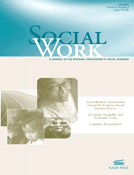
SOCIAL WORK
Connecting Theory and Practice in Social WorkSOCIAL WORK, published by Oxford University Press Inc, stands as a leading journal in the fields of social work, sociology, and political science, underscoring its vital role in advancing research and practice methodologies since its inception in 1956. The journal, with its ISSN 0037-8046 and E-ISSN 1545-6846, consistently showcases high-impact research, holding a Q2 ranking in both Medicine (miscellaneous) and Social Work categories, along with an impressive Q1 designation in Sociology and Political Science. This underscores its importance in the academic landscape, ranking #299 out of 1466 in Scopus for Social Sciences, marking it in the 79th percentile for its scholarly contribution. Although not an open-access journal, it provides a wealth of resources for researchers, practitioners, and students aiming to stay at the forefront of social work innovations, policies, and community practices. By publishing rigorous studies and critical analyses, SOCIAL WORK promotes dialogue and collaboration across disciplines, making it an essential resource for those dedicated to enhancing societal wellbeing.
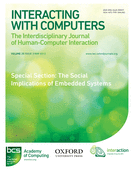
INTERACTING WITH COMPUTERS
Fostering Dialogue in the Evolving Tech LandscapeINTERACTING WITH COMPUTERS is a renowned journal published by Oxford University Press, focusing on the interdisciplinary field of Human-Computer Interaction, as well as aspects of Library and Information Sciences and Software. With a rich history of publication since 1989, this journal has established itself as a significant platform for scholars to disseminate cutting-edge research and innovative methodologies that enhance our understanding of how humans engage with technology. Despite being classified in the Q3 and Q2 quartiles across various categories, its 2023 Scopus rankings highlight its relevance, positioning it within the 69th percentile for Library and Information Sciences. This makes it an essential resource for researchers, professionals, and students looking to stay informed about the latest advancements and discussions in this rapidly evolving domain. Though not currently open access, INTERACTING WITH COMPUTERS offers substantial insights that are crucial for driving forward the conversation in Human-Computer Interaction, ensuring its relevance in both academic and applied contexts.